Anand L. Rai’s Atrangi Re opens with Toofan Si Kudi where Rinku Sooryavanshi (Sara Ali Khan) runs towards the Siwan railway station. “Thath se thitholi hai, risk mein rangoli, toofan si kudi udi,” the lyrics describe her. She dazzles everybody with her colorful gait, like a swirling storm. All this happens during a literal rainstorm. Rinku makes another futile attempt to run away from her home after failing twenty-one times earlier. She is ‘aashiqui me jalta hua koyla‘, burning with a deep love for her secret boyfriend whose identity she refuses to reveal to anyone. Tired of her shenanigans, her family members kidnapped a Tamil doctor S. Venkatesh Vishwanath Iyer, also known as Vishu (Dhanush), and forcefully married him to Rinku.
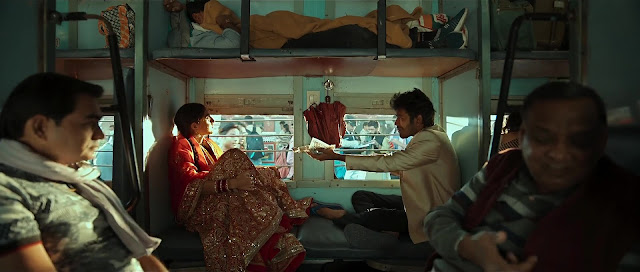
Neither Rinku nor Vishu wants to be in forced marriage; thus, the two decide to go separate ways once they reach Delhi. But something starts happening to Vishu. He asks Rinku to come along to Madurai to attend his ‘real’ engagement. Things don’t turn out as planned, and his engagement is called off. An upset Vishu returns to Delhi. He is not upset that his engagement did not happen. He is upset that he is not feeling bad about it. Because he has fallen in love with the ladki hai yeh Rambha, karti hai Zumba Rinku. She, however, is waiting for her lover, the magician Sajjad Ali Khan (Akshay Kumar) to return from Africa. It is a bit like Saawariya, where Raj (Ranbir Kapoor) falls in love with Sakina (Sonam Kapoor), who is waiting for her lover Imaan (Salman Khan). Saawariya ends when Imran returns, and Sakina starts a life with him, leaving Raj heartbroken. Atrangi Re starts like Saawariya but then takes a different turn when Sajjad arrives at the interval.
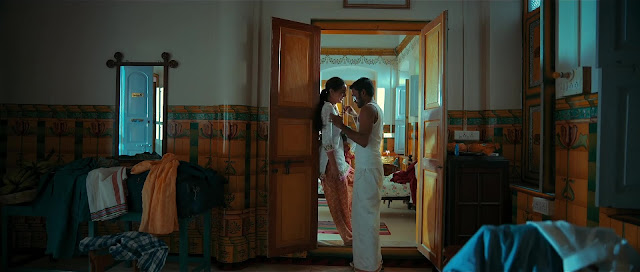
It is revealed that Sajjad does not exist in reality. He is present only in Rinku’s imagination. There is some kind of Electra Complex at play here where Sajjad is the manifestation of her father in her mind. Rinku sees him as her boyfriend. Sajjad came to life to help her deal with the trauma where her parents were killed in front of her. She holds on to her childhood memories as she never received the love in life from her toxic family. And then, it all starts to make sense. The title Atrangi Re that had implied a hint of weirdness and madness. The casting of Akshay Kumar as Sajjad, who is nearly thirty years older than Sara Ali Khan. The first meeting between Rinku and Sajjad where she goes and jumps in his arms, like a daughter running to her father.

It was from here that Atrangi Re went further into unchartered territory. Vishu and his friend Madhu (Ashish Verma) start treating Rinku using their own methods. They give her some tablets that cause some involuntary actions in Sajjad. He cuts himself. He falls from the tree and so on. They believe Sajjad to be like an invading virus that tablets can help cure. But none of these tricks really work. In fact, Rinku started to take more care of Sajjad. And, then, Atrangi Re uses the power of love to cure Rinku.

There are two ideas of love presented in the film. Rinku believes in the love that is larger than life. The one where people have to fight for it. Jis love me chaar-paanch ka sar na phoote, gharwaale kutte na ban jaye, seher me badnaami na ho, mohalle me chappal na chal jaye. She finds that larger-than-life love in Sajjad by virtue of seeing it in her parents, who had to fight their entire family to be together. They ran away from home. Rinku’s story is the same. A Thakur girl in love with a Muslim boy. Sajjad is a magician. He can do anything. He walks on fire. He arrives with the sound of trumpets and plays the dhol. Garda uda diya is his anthem; garda represents something huge. He dresses in attractive colors. The other side is the quiet, shy, and unassuming love that manifests in Vishu. He is not the Love Ka Thaliava. He finds love in the little things. Like when Rinku agrees to come with him to Madurai. Like when Rinku wears his sweatshirt. He literally sings Little Little. Love me little, little, little. He is a doctor whose love will help heal Rinku. He stands up for her when needed because she is his wife. I did not think the film advocates that either of them is better. Rinku, as she says, wants both of them. Each has his own role. The former helped her survive; the latter helped her heal.
Then comes my favorite part. They all travel to Agra, where Sajjad would perform a magic trick to make the Taj Mahal disappear. Vishu and his friends go along with the charade to keep Rinku happy. However, the trick fails. The Taj Mahal does not disappear. Rinku is disappointed and dejected. Her hero has failed. She starts crying as it reminds her of her father, who failed while performing a similar magic trick. The entire sequence happens in front of one of the greatest symbols of love—the type of love that Rinku believed in. I was reminded of Rai’s last film Zero where Bauua Singh (Shah Rukh Khan) could move the stars on his fingertips. He elopes on his wedding day, leaving his bride Aafia (Anushka Sharma) at the altar, and runs to Bombay. At a party there, he tries to perform his trick of moving the stars in front of the ladies. He could not move them even one bit. The star Babita Kumari (Katrina Kaif) tells him that when you break someone’s heart, even the stars won’t listen to you. Bauua lost his essence because of the way he behaved with Aafia. The hero had failed there, too.

Like Bauua could move the stars, Sajjad could change the weather simply by snapping his fingers. After the failure of his trick, Sajjad calls Rinku and tells her that he is still the same. It was she who had changed. She does not wish to see him anymore as she has found Vishu. It is the hero in her mind who has changed. And, thus, we see that Sajjad is dressed the way Vishu does. He used to wear the clothes of a magician. Now, he has dressed in checkered shirts and sweaters, the same clothes that Vishu is wearing. He is gradually getting replaced with Vishu. At this point, Sajjad knew it was time to leave. There is a fabulous climax at the railway station. Sajjad does the magic trick one last time and goes forever. Rinku does not need to run anymore and comes back to Vishu.

Atrangi Re is so weird and wonderful that I could not stop wondering where it would go next. I have liked this one the most from all the earlier films of Anand L. Rai and Himanshu Sharma. Their characters are often unlikeable because of their arrogance. These characters are not also able to move on in life. The guilt of the horrible things they did to their partners or the inability to accept the death of the relationship makes them come back. In Raanjhanaa, Kundan (Dhanush) reveals the identity of Zoya’s (Sonam Kapoor) lover to her family, leading to his death. He feels guilty and takes refuge in spirituality, as portrayed in the song Tohe Piya Milenge. He visits a gurudwara, a mandir, and a dargah to seek inner peace. A wise man tells him at the bank of Ganga that he will not find solace by sitting there. He goes back to Zoya’s life to ask for forgiveness even if she does not want him anymore. In Zero, Bauua does the same thing. He leaves Aafia at the altar, but he comes back begging for forgiveness. His dilemma is shown in the song Tanha Hua where he gives his money and clothes to performers on the streets to assuage his guilt. In Tanu Weds Manu Returns, Tanu (Kangana Ranaut) and Manu (Madhavan) get separated. Manu finds Datto (Kangana Ranaut), who looks like a carbon copy of his first wife. Manu is not marrying Datto; he is marrying a nicer version of Tanu again. In Atrangi Re, Rinku holds onto the love that she received when she was young. She never let go of her father and invented his spirit Sajjad as her boyfriend. Manu found a lookalike wife; Rinku imagined a lookalike father.

Rinku also comes across as unlikeable, as she is cut from the same cloth as the feisty Tanu. She calls herself acid, who can burn everyone. She threatens to kill her family members. She is no damsel in distress. She says she is “channt” because her family members would have killed her if she were not. We see this contrast with the love Mandy (Dimple Hayathi) got from her father. When Vishu calls Mandy from Bihar, his father feeds her food from his own hands. After Rinku is married, she does not cry even once. On the train, she is the one who gets food for Vishu. We have seen that the hero usually does this bit in films. She flirts with Vishu while he gets shy and conscious, saying that someone will see them together. “Ab humari line bhi tum hi bologe,” she tells him. Initially, it is hard to read why she is doing all this if she is in love with Sajjad. But, gradually, the film reveals all.
Many other scenes keep reminding us of the writer-director duo’s previous work. The expansive balconies and the verandahs are reminiscent of their earlier films. Children make an appearance in the final moments Raanjhana and Atrangi Re. The poster of Raanjhana where Zoya hugs Kundan is also seen as a scene in Atrangi Re. In Tanu Weds Manu Returns, Tanu dances at her husband Manu’s wedding on Ghani Bawri. Manu is remarrying someone who looks a lot like his first wife. In Atrangi Re, Rinku dances in her husband’s engagement. The hero’s friend is also a staple in the films of Anand L. Rai, whose job is often to provide advice to his friend and comic relief to the audience. In Raanjhana, Kundan’s friend Murari (Mohammed Zeeshan Ayyub), who was as much a ranjhanaa in his friendship, goes to all lengths for his friend. He was more a Sudama than a Murari (Krishna). He literally goes mad when Kundan dies. In Tanu Weds Manu, Manu’s friend Pappi Ji (Deepak Dobriyal) was always with him at all stages of his life. In Zero, Bauua’s friend Guddu (Mohammed Zeeshan Ayyub) was with him through thick and thin. In Atrangi Re, Vishu’s friend Madhu plays a significant role in his life and often gives the most absurd advice to him.

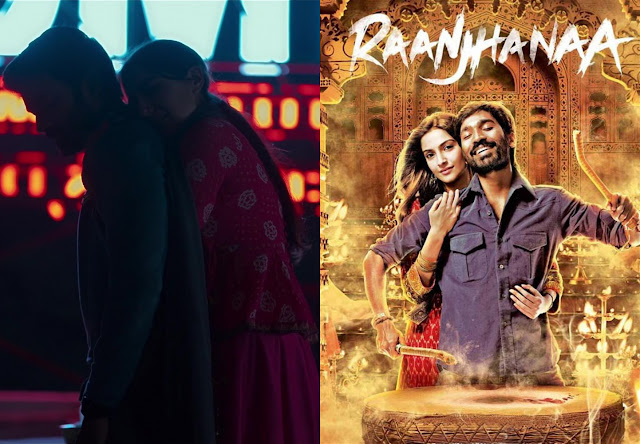

Atrangi Re would not have been the film if not for the music and lyrics of A.R. Rahman and Irshad Kamil. The songs are woven splendidly in the film. After ages, I have enjoyed a song, such as Chaka Chak, which is sung and choreographed beautifully. There are no disco lights in the studio. There are no glaring camera lights. It is shot in natural light in a courtyard. The lyrics talk about a girl saying to her lover that she is the best for him. She has her flaws, but she is ok with that. Achhi bhi hun, buri bhi hun. She is also openly talking about her sex life in front of everyone.
Palang tootata pehli raat,
Sara mohalla karta awaaj,
Hui chaubaare mein barsaat,
Kaun wahan tha kiske saath.
My scandalous ways
are the talk of the town.
My personal life
is what creates a buzz.


Tere Rang is another beautiful composition. The song was already depicted in the film, but it takes an altogether new meaning when it plays in the climax. Its initial beats are similar to Manmohini Teri Adaa from Hum Dil De Chuke Sanam. Its lyrics are based on Radha-Krishna’s story and talk about being merged with the color of the lover. It is the time of Holi. Everyone is playing with colors. The woman wants to meet her lover, but she avoids getting colored by anyone else. She stops the kids. She stops her family members. She stops the people on the streets. The only person she allows to put color on her is her lover. Tere rang ranga, mann mehkega. The hand movements of the two lovers in the song are reminiscent of Zoya and Kundan’s in Tum Tak from Raanjhanaa. Further in the song, there is the depiction of Muharram. Sajjad is flagellating himself with chains as part of the procession. His lover wants to meet him, but her family does not allow her. She starts flagellating herself, again, becoming like him. Tere rang ranga, mann mehkega, tann dehkega. There are two more nice songs in the film, both by Arijit Singh—Rait Zara Si (also part of the background score) and Tumhein Mohabbat Hai.

Sara Ali Khan as Rinku is spunky, especially in the first half, but has a lot to improve in the scenes that involve crying. Her attempts to cry do not seem natural; they seem effortful. Akshay Kumar has a small part which he does well. There is no moralistic grandstanding that appears to be the hallmark of his recent performances. His casting is age-appropriate in hindsight. However, it is Dhanush who is simply marvelous as Vishu. He does not even need to speak his lines because he communicates through his emoting. He says in Tamil, but we can understand his feelings. “Ab main hi pehle jaisa nahi raha, toh kuch bhi pehle jaisa kaise hoga.” His performance makes his character better than the way it is written.

In another charming scene, Vishu asks Rinku to come to Madurai if she feels like joining him. She plays with words to ultimately make him speak his heart out. He wants her to come along with him, and she agrees. He expresses his joy by doing a little dance when he is alone but is caught by Rinku. Later, when he finds out that Sajjad resides only in Rinku’s imagination, he again expresses his happiness and relief when he dances alone in the toilet of the railway station. His dancing reaches a pinnacle in Little Little. There is tremendous grace and delicacy in his dancing. In Raanjhanaa, too, Kundan danced on the streets when Zoya agreed to meet him.

One issue with the screenplay was that Vishu’s love for Rinku happens far too suddenly. There is not enough time in the script to develop his feelings for her organically. Within two to three days of knowing Rinku, Vishu starts experiencing life-changing love. I wish there were more of the flirtatious banter between them. Like the one where her mangalsutra gets tied in his thread. She tries to make him conscious. “Hai Vishu Babu, itna drama.” It is reminiscent of the scene from Hum Dil De Chuke Sanam where Nandini’s (Aishwarya Rai) mangalsutra gets stuck in Vanraj’s (Ajay Devgn) blazer.

The film is not interested in going deeper into issues of mental health. One particular scene clubs different mental issues, such as Alzheimer’s, schizophrenia, and bipolar disorder, under one category, which I felt was gratuitous. It belies any basic understanding of these issues. For instance, at a later stage, Vishu pays money to spectators for clapping, which makes more sense. But, other than that, I was fascinated by its daring. At one point, Vishu picks up Sajjad, and all his friends even pretend to perform surgery on him. When Vishu comes dancing with a horse, Rinku makes fun of non-existent people, unaware of her own vision to see non-existent people. It is so bizarre and yet so captivating.
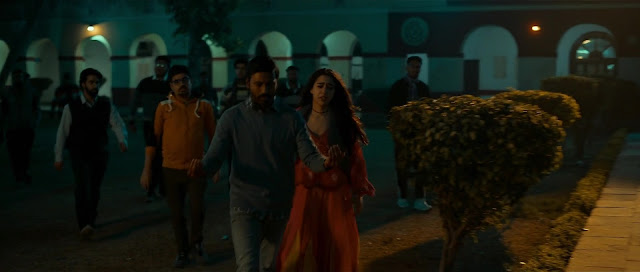
Atrangi Re is a film framed in colors. Pankaj Kumar’s cinematography has beautifully used lights and colors throughout the film. The film has many other tiny details. Early on in the film, Rinku breaks bottles at the railway station. Later, Vishu also breaks bottles when he tries to compete with Sajjad. A character initially wonders about the existence of Sajjad. He says that he is probably a ghost which makes sense later on. In another blink-and-miss ghost-related moment, when Sajjad returns, he watches Bhoothnath Returns. Atrangi Re also tries to keep us away from the climactic surprise by showing little girls at different points. Initially, a young girl watches Rinku throwing bottles at the railway station. When she comes home, a little girl looks at her. It is a clever trick by the filmmakers as the little girl in Tere Rang turns out to be Rinku. Another interesting thing is that Sajjad’s full name Sajjad Ali Khan is similar to Sara’s real-life father, Saif Ali Khan.

Lights

Cinematography
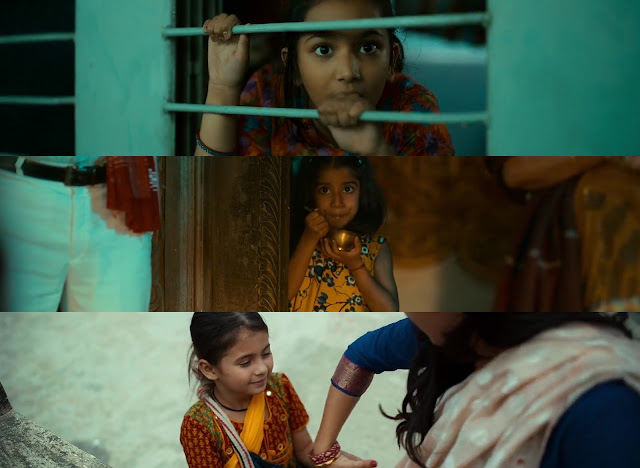
Little Girls
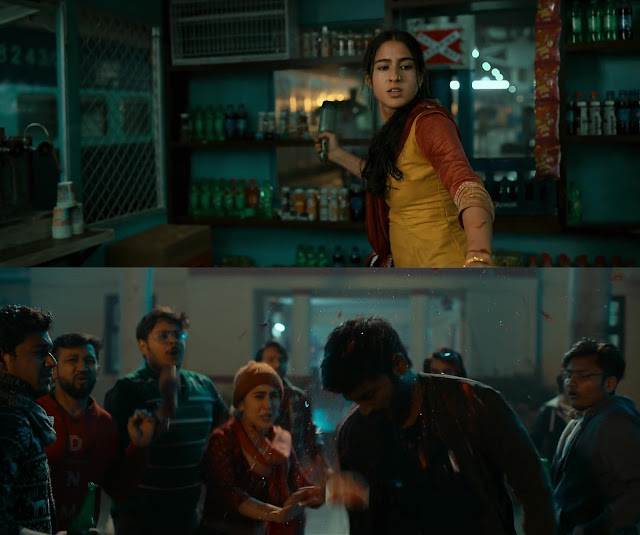
Bottles
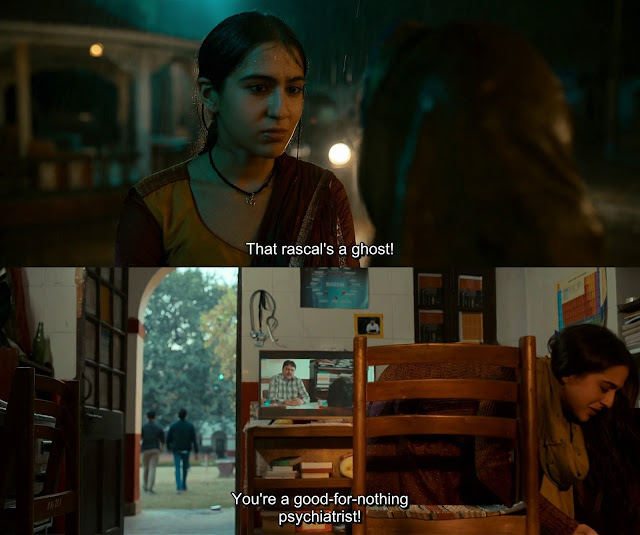
Ghosts
In the film Paheli, a ghost falls in love with a woman. He said, “Aurat ke dil me jo preet hove, woh hu main.” He is the yearning that resides in a woman’s heart. The ghost masquerades as the woman’s husband, and then, he actually, becomes the husband by merging with him. In the final moments of Atrangi Re, Rinku describes Sajjad as someone who always gives in love and does exactly what the girl asks him to do and I kept thinking that Atrangi Re will also end somewhat like this. However, it ends more movingly, making it magical. There are two similar shots that we see. Rinku is being held in the arms of Vishu, the same way Sajjad held her as a kid. She found love in her father but now finds love in her husband. “Meri wife waapas aa gayi,” celebrates Vishu. She has healed. Films show different forms of love. Atrangi Re shows the form of love that can heal.
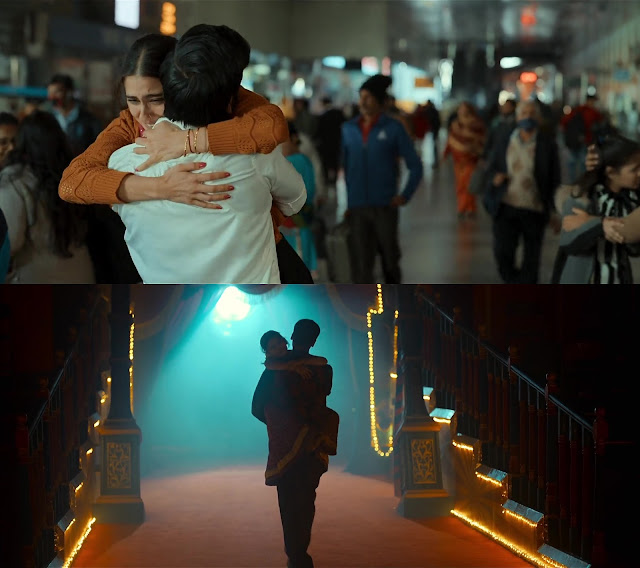
[Read more of the author’s work on his blog here]

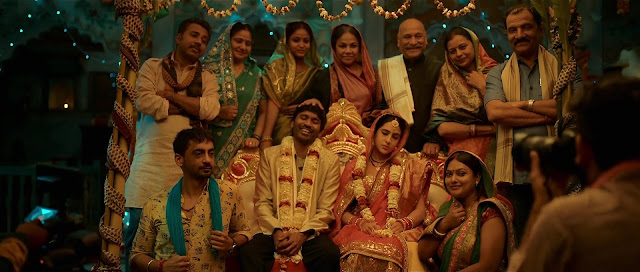








Leave A Comment
You must be logged in to post a comment.